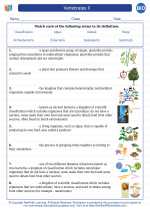Runoff
Runoff is the flow of water over the land surface, which occurs when the soil is saturated and unable to absorb any more water, or when the intensity of rainfall exceeds the infiltration capacity of the soil. It is an important process in the water cycle and can have significant impacts on the environment.
Causes of Runoff
Several factors can contribute to runoff, including:
- Rainfall Intensity: High intensity rainfall can lead to increased runoff, as the soil may not be able to absorb the water fast enough.
- Soil Type: Soils with low permeability, such as clay soils, are more prone to generating runoff.
- Slope of the Land: Steep slopes can accelerate the movement of water, leading to more runoff.
- Land Use: Urban areas with impervious surfaces, such as roads and buildings, can increase surface runoff compared to natural landscapes.
Impacts of Runoff
Runoff can have several environmental impacts, including:
- Soil Erosion: Excessive runoff can lead to erosion, as the flowing water can carry away soil particles.
- Water Pollution: Runoff can pick up pollutants from the land surface, such as pesticides, fertilizers, and oil, and carry them into water bodies, leading to pollution.
- Flooding: High volumes of runoff can overwhelm drainage systems and lead to flooding in urban areas.
- Habitat Destruction: Runoff can alter the natural flow of water in ecosystems, impacting aquatic habitats and the organisms that depend on them.
Study Guide
To understand the concept of runoff, it is important to study the following topics:
- Water Cycle: Understand the different processes involved in the water cycle, including precipitation, evaporation, and runoff.
- Soil Permeability: Learn about the factors that influence the ability of soil to absorb water, such as soil texture and structure.
- Surface Runoff vs. Groundwater Flow: Differentiate between surface runoff, which flows over the land surface, and groundwater flow, which occurs beneath the surface.
- Environmental Impacts: Explore the environmental impacts of runoff, including soil erosion, water pollution, and flooding.
By mastering these topics, you will gain a comprehensive understanding of runoff and its significance in the environment.
[Runoff] Related Worksheets and Study Guides:
.◂Biology Worksheets and Study Guides High School. Vertebrates II
Worksheet/Answer key Vertebrates II
Vertebrates II  Worksheet/Answer key
Worksheet/Answer key Vertebrates II
Vertebrates II  Worksheet/Answer key
Worksheet/Answer key Vertebrates II
Vertebrates II  Vocabulary/Answer key
Vocabulary/Answer key Vertebrates II
Vertebrates II  Vocabulary/Answer key
Vocabulary/Answer key Vertebrates II
Vertebrates II  Vocabulary/Answer key
Vocabulary/Answer key Vertebrates II
Vertebrates II 

 Worksheet/Answer key
Worksheet/Answer key
 Worksheet/Answer key
Worksheet/Answer key
 Vocabulary/Answer key
Vocabulary/Answer key
 Vocabulary/Answer key
Vocabulary/Answer key
 Vocabulary/Answer key
Vocabulary/Answer key

The resources above cover the following skills:
LIFE SCIENCE (NGSS)
Ecosystems: Interactions, Energy, and Dynamics
Students who demonstrate understanding can:
Use mathematical representations to support and revise explanations based on evidence about factors affecting biodiversity and populations in ecosystems of different scales.